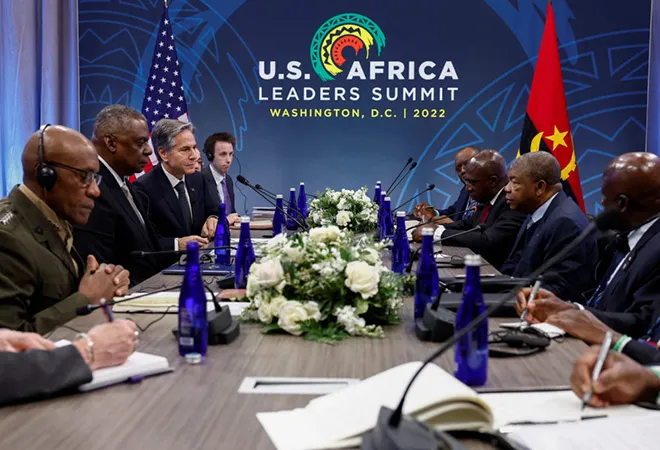-
CENTRES
Progammes & Centres
Location
The US needs to double down on its engagement with Africa, especially in areas such as governance, climate adaptation, and trade.

From December 13 to 15, President Biden hosted leaders across the African continent in Washington D.C. for the US-Africa Leaders’ Summit. Reportedly, 49 African governments, the African Union Commission, representatives from civil society and the private sector, young leaders, and the African diaspora in the United States (US) attended the event for three days. The summit demonstrated the US’ renewed commitment to Africa and provided President Biden’s administration with an opportunity to discuss issues of mutual interest and enhance cooperation on shared global priorities.
However, the twin challenges of the COVID-19 pandemic and the ongoing Russo-Ukrainian conflict now threaten to reverse decades of hard-won macroeconomic, socio-economic, and governance gains on the continent.
The summit was convened at a time when Russia’s war in Ukraine has disrupted Africa’s recovery from the COVID-19 pandemic by exacerbating food and energy insecurities, causing inflation, and massive disruptions in trade and supply chains. Before 2020, African countries were some of the fastest-growing in the world. However, the twin challenges of the COVID-19 pandemic and the ongoing Russo-Ukrainian conflict now threaten to reverse decades of hard-won macroeconomic, socio-economic, and governance gains on the continent.
For some time, there has been a bipartisan consensus among policymakers on the need for the US to renew, revitalise, and prioritise its engagement with Africa. Traditionally, the US engagement in Africa has tended to focus on promoting democratic norms, foreign aid, reducing poverty, and addressing conflict and insecurities. While these priorities are important, they fail to take into account the fast-paced changes occurring across the continent. Today, Africa has emerged as one of the world’s most sought-after destinations for digital innovation and entrepreneurship. New and emerging technologies associated with the Fourth Industrial Revolution (4IR) hold both opportunities and risks in critical sectors. However, owing to demographic and relational shifts, the US has lost ground in Africa over the last decade, with declining trade and investment flows.
Another major concern is about the sustainability of US-Africa relations, given the fact that US-Africa summits tend to be rather infrequent. The last summit took place back in 2014. This massive gap of eight years between 2014 and 2022 is regrettable given the fact that Africa’s other development partners like the European Union (EU), China, India, Japan, Turkey, and the United Arab Emirates (UAE), have all regularly held summit meetings with African counterparts. Unlike in previous years, African countries have today reduced their dependence on Western aid. They have diversified their basket of external partners and their leaders and governments are actively voicing their national interests and concerns, and participating in the process of setting the agenda.
Africa has emerged as one of the world’s most sought-after destinations for digital innovation and entrepreneurship. New and emerging technologies associated with the Fourth Industrial Revolution (4IR) hold both opportunities and risks in critical sectors.
Despite these challenges, US diplomacy in Africa has witnessed an upswing in recent months. The launch of a new US Strategy Toward Sub-Saharan Africa in August 2022 and the convening of a second US-Africa Leaders Summit is indicative of this change. The new strategy acknowledges Africa’s centrality to the US national interests and the region’s value as an economic partner. It emphasises “African agency” and attempts to downplay perceptions of Africa as an arena for great-power rivalry. Previous attempts by the US to frame its engagement with Africa as exclusively aimed at countering Chinese and Russian influence, as a form of zero-sum competition, have failed to produce dividends or any desired results. Therefore, it is in the US’ interest to redouble its efforts in areas it has a comparative advantage like governance, climate adaptation, just energy transition, and strengthening commercial ties, especially through a deeper focus on trade and investment.
Thus the US-Africa Leaders Summit proved to be an opportunity for President Biden to personally make the case for Washington’s renewed approach towards Africa. It offered a chance to operationalise some of the well-intended commitments the Biden administration has made up to this point.
The Biden-Harris administration is set to invest at least US$55 billion in Africa over the next three years, ning across a range of diverse sectors. This is a hefty amount and it is in the US’ interest to follow through with its commitment. To coordinate and oversee these efforts, Ambassador Johnnie Carson, who is the former Assistant Secretary of State for African Affairs, is set to become the new Special Presidential Representative for the US-Africa Leaders Summit implementation.
The new strategy acknowledges Africa’s centrality to the US national interests and the region’s value as an economic partner.
The US Trade Representative signed an MoU with the African Continental Free Trade Area (AfCFTA) Secretariat to support institutions to accelerate sustainable economic growth across Africa.
Indeed, the US-Africa Leaders summit was convened at a critical juncture when there was a realisation for a much-needed push in US-Africa relations, both in terms of substance and strategic vision. President Biden is yet to visit Africa, but his top diplomat, Secretary Blinken has already visited the continent three times in the last year. Symbolism, through personal visits, matters a great deal to the African countries and their leaders. Following the summit, the first order of business for the US should be to make the conference a regular event, rather than some sort of a sporadic meeting.
It is important to acknowledge that for African countries, both the US and China are important developmental partners, having different levels of relations. In several areas, Chinese firms are outperforming the US, like in road and bridge construction, owing to its lower cost structures. But there are areas, where US companies are competitive like healthcare, renewable energy, and financial technology. The US needs to double down on these comparative advantages and co-opt and engage its large and vibrant diaspora, many of whom maintain commercial connections with Africa. The time is now for the US to demonstrate its sustained commitment to Africa and Africans.
The views expressed above belong to the author(s). ORF research and analyses now available on Telegram! Click here to access our curated content — blogs, longforms and interviews.

Abhishek Mishra is an Associate Fellow with the Manohar Parrikar Institute for Defence Studies and Analysis (MP-IDSA). His research focuses on India and China’s engagement ...
Read More +